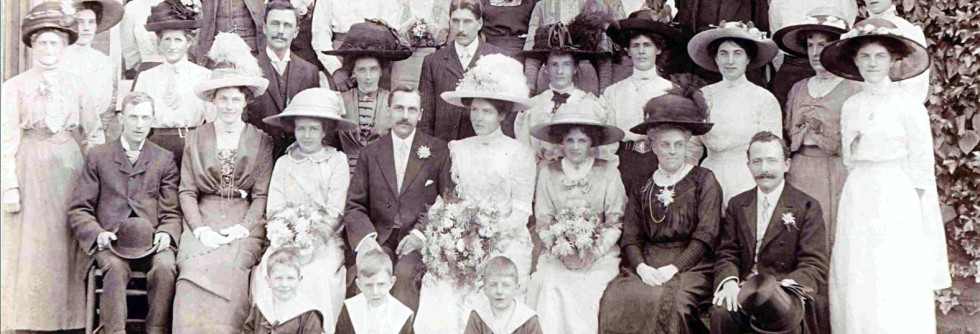After my great-grandfather, Walter William Rowe, died in 1879, my great-grandmother, Hannah, remarried. Although I’ve searched for years, I have found no record of her second marriage. I suspect that it was a marriage that was never blessed by either church or state.
Hannah was born Hannah Mitchell Howes on 22 December 1853 in West Lynn, Norfolk, England. Howes was her mother’s maiden name, Mitchell the name of her reputed father. When Hannah’s parents eventually married in 1861, Hannah began sometimes using the surname Mitchell; on other occasions she reverted to Howes.

Hannah’s first marriage was to Walter William Rowe. The couple married on 31 July 1876 in Willington on Tyne, Northumberland, where they were both living at the time. On her marriage certificate, Hannah’s surname was given as Howes, and oddly enough, her father’s surname was also recorded as Howes rather than Mitchell. On the other hand, when Hannah and Walter’s daughter, Mary, was born in 1879, Hannah gave her maiden name as Mitchell. So searching for records relating to Hannah is complicated by her alternating use of either Howes or Mitchell as her surname.

Less than 6 months after their daughter Mary’s birth in 1879, Hannah’s husband, Walter William Rowe, died in West Lynn, Norfolk. And very shortly after Walter’s death, Hannah remarried. Hannah and her second husband had a child born around September 1880, a little more than a year after her first husband’s death.
So why can’t I find a marriage record for Hannah and her second husband? I think it’s because her second husband, Francis Finish Rowe, was a younger brother of her first husband. In the Jewish faith a marriage between a man and his deceased brother’s widow would be accepted, and even encouraged. However, in England, such a marriage was illegal until a 1921 act of parliament.

My aunt, Evangeline Clarke, Hannah’s granddaughter, felt certain that the couple did marry even though it would have been illegal to do so. It would certainly have been easy enough to do, especially if the marriage took place in a parish where neither of the couple was well known. No-one would have known that Hannah was marrying the brother of her deceased husband.
I have searched for a marriage record using surnames Howes, Mitchell, and Rowe, and their variants. I have extended the search beyond Norfolk and Northumberland to include all of England and Wales, and Scotland, too. I have pored over parish registers and civil registration indexes. And I still haven’t found a record of their marriage. Although I’m 99% certain that it did not take place, I will continue to look for proof of Hannah’s second marriage because of that small doubt that my aunt might have been right, and that there was really was a marriage.
Sources:
- Probert, Rebecca. (2012) Marriage law for genealogists: the definitive guide. Great Britain: Takeaway.
- General Register Office of England and Wales. Certified Copy of an Entry of Death. West Lynn, Norfolk. 22 June 1879. Rowe, Walter William. Copy dated 15 October 1998.
- General Register Office of England and Wales. Certified Copy of an Entry of Birth. West Lynn, Norfolk. 22 December 1853. Howes, Hannah Mitchell. Copy dated 23 April 1999.
- General Register Office of England and Wales. Certified Copy of an Entry of Birth. West Lynn, Norfolk. 11 January 1879. Rowe, Mary Jane. Copy dated 13 August 1998.
[print_link]

